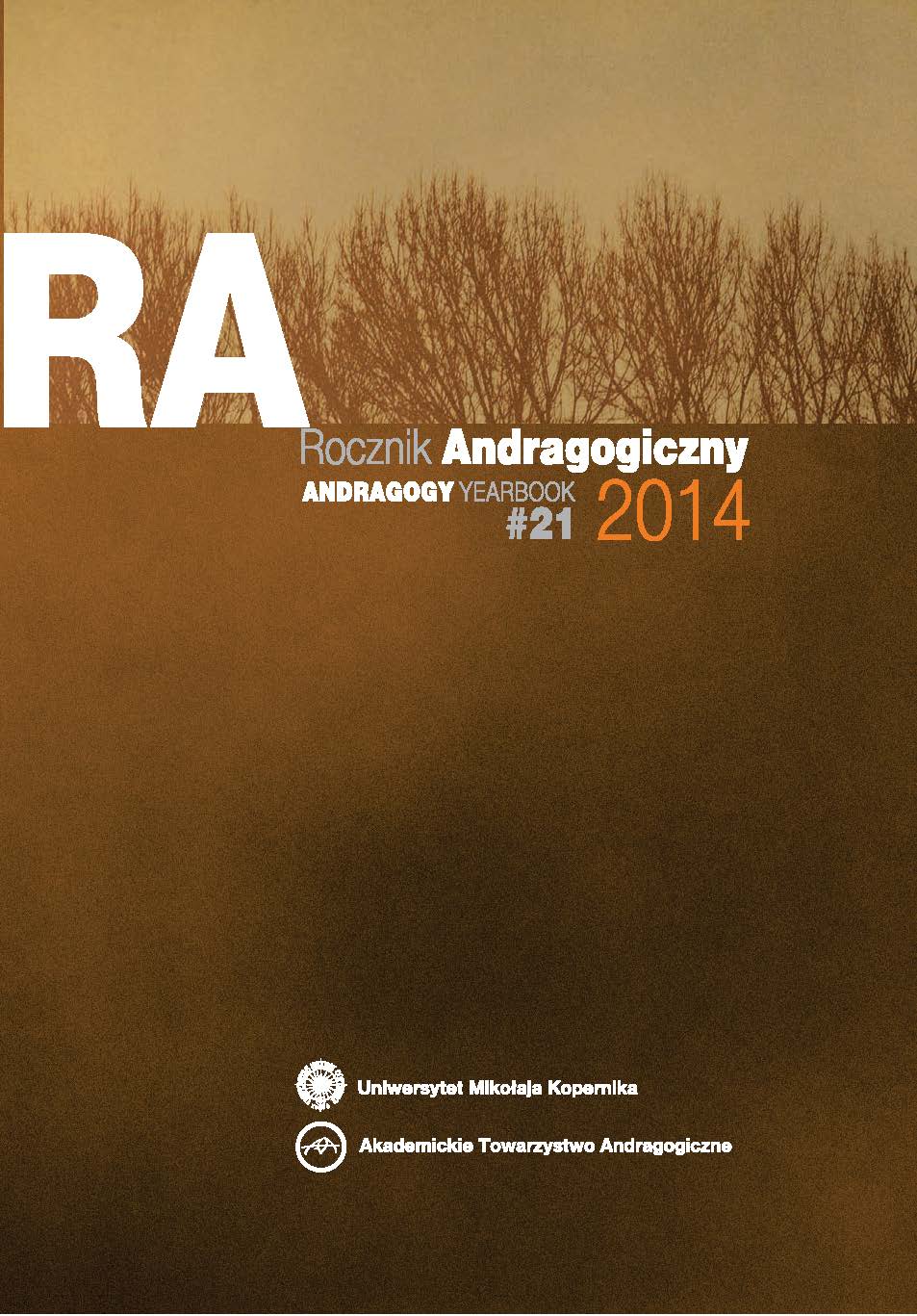Aktywność edukacyjna kobiet bezrobotnych: wybrane uwarunkowania
DOI:
https://doi.org/10.12775/RA.2014.015Słowa kluczowe
bezrobotna kobieta, doskonalenie zawodowe, samoocena, styl radzenia sobieAbstrakt
Bezrobocie jest zjawiskiem ocenianym negatywnie zarówno z punktu widzenia jakości życia jednostek, jak i funkcjonowania społeczeństwa. W systemie przewidziane są sposoby niwelowania negatywnych konsekwencji bezrobocia. Jednak nie wszyscy, którzy mają trudności w znalezieniu pracy, podejmują decyzję o skorzystaniu z tych możliwości. Celem badań było poznanie roli samooceny kobiet i stosowanych przez nie stylów radzenia sobie w sytuacjach stresowych w podejmowaniu decyzji o doskonaleniu zawodowym. W badaniach wykorzystano Kwestionariusz Radzenia Sobie w Sytuacjach Stresowych (CISS) i Skalę Samooceny M. Rosenberga (SES). Badaniami objęto 60 bezrobotnych kobiet. Rezultaty badań wskazują, że poziom samooceny kobiet bezrobotnych aktywnie zaangażowanych w powiększane swych zasobów przez doskonalenie zawodowe jest wyższy niż u kobiet bezrobotnych, które nie podjęły podobnej decyzji. Kobiety bezrobotne zaangażowane w doskonalenie zawodowe przejawiają zadaniowy styl radzenia sobie ze stresem w odróżnieniu od kobiet, które nie podjęły takiej decyzji.
Bibliografia
Aronson E., Wilson T. D., Akert R. M. (1997), Psychologia społeczna: serce i umysł,tłum. A. Bezwińska et al., Zysk i S-ka. Wydaw., cop., Poznań.
Bandura A. (2007), Teoria społecznego uczenia się, tłum. J. Kowalczewska, J. Radzicki, Wydawnictwo Naukowe PWN, Warszawa.
Dzwonkowska I., Lachowicz-Tabaczek K., Łaguna M. (2008), Samoocena i jej pomiar. Skala samooceny SES M. Rosenberga, Pracownia Testów Psychologicznych PTP, Warszawa.
Gurba E. (2011), Wczesna dorosłość, [w:] J. Trempała (red.), Psychologia rozwoju człowieka, Wydawnictwo Naukowe PWN, Warszawa, s. 287–311.
Hobfoll S. E. (2006), Stres, kultura i społeczność, tłum. M. Kacmajor, GWP, Gdańsk. Juczyński Z., Ogińska-Bulik N. (2008), Osobowość, stres a zdrowie, Wydawnictwo
Difin, Warszawa.
Kulas H. (1986), Samoocena młodzieży, WSiP, Warszawa. Liberska H. (1994), Efektywność strategii rozwiązywania problemów intelektualnych – rozwój w okresie dorastania, „Człowiek i Społeczeństwo”, XI, s. 167–182.
Liberska H. (2004), Perspektywy temporalne młodzieży. Wybrane uwarunkowania, Wydawnictwo Naukowe Uniwersytetu im. Adama Mickiewicza, Poznań.
Liberska H. (2007), Współczesny obraz moratorium, [w:] B. Harwas-Napierała, H. Liberska (red.), Tożsamość a współczesność. Nowe tendencje i zagrożenia, Wydawnictwo Naukowe Uniwersytetu im. Adama Mickiewicza, Poznań, s. 25–52.
Liberska H. (2011), Teorie rozwoju psychicznego, [w:] J. Trempała (red.), Psychologia rozwoju człowieka, Wydawnictwo Naukowe PWN, Warszawa, s. 71–126.
Obuchowska I. (1996), Drogi dorastania, WSiP, Warszawa.
Oleszkowicz A., Senejko A. (2011), Dorastanie, [w:] J. Trempała (red.), Psychologia rozwoju człowieka, Wydawnictwo Naukowe PWN, Warszawa, s. 259–286.
Rosenberg M. (1965), Society and the adolescent self-image, Princeton University Press, Princeton.
Ratajczak Z. (2000), Stres – radzenie sobie – koszty psychologiczne, [w:] I. Heszen-Niejodek, Z. Ratajczak, (red.), Człowiek w sytuacji stresu, Wydawnictwo UŚ, Katowice.
Strelau J. (red.) (2000), Psychologia, Gdańskie Wydawnictwo Psychologiczne, Gdańsk.
Tyszkowa M. (1990), Aktywność i działalność dzieci i młodzieży, WSiP, Warszawa.
Tyszkowa M., Przetacznik-Gierowska M. (1996), Psychologia rozwoju człowieka, t. 1, Wydawnictwo Naukowe PWN, Warszawa.
http://stat.gov.pl/cps/rde/xbcr/gus/f_kobiety_i_mezczyzni_na_rynku_pracy_2012.pdf (dostęp: 20.03.2015).
Pobrania
Opublikowane
Jak cytować
Numer
Dział
Statystyki
Liczba wyświetleń i pobrań: 621
Liczba cytowań: 0



